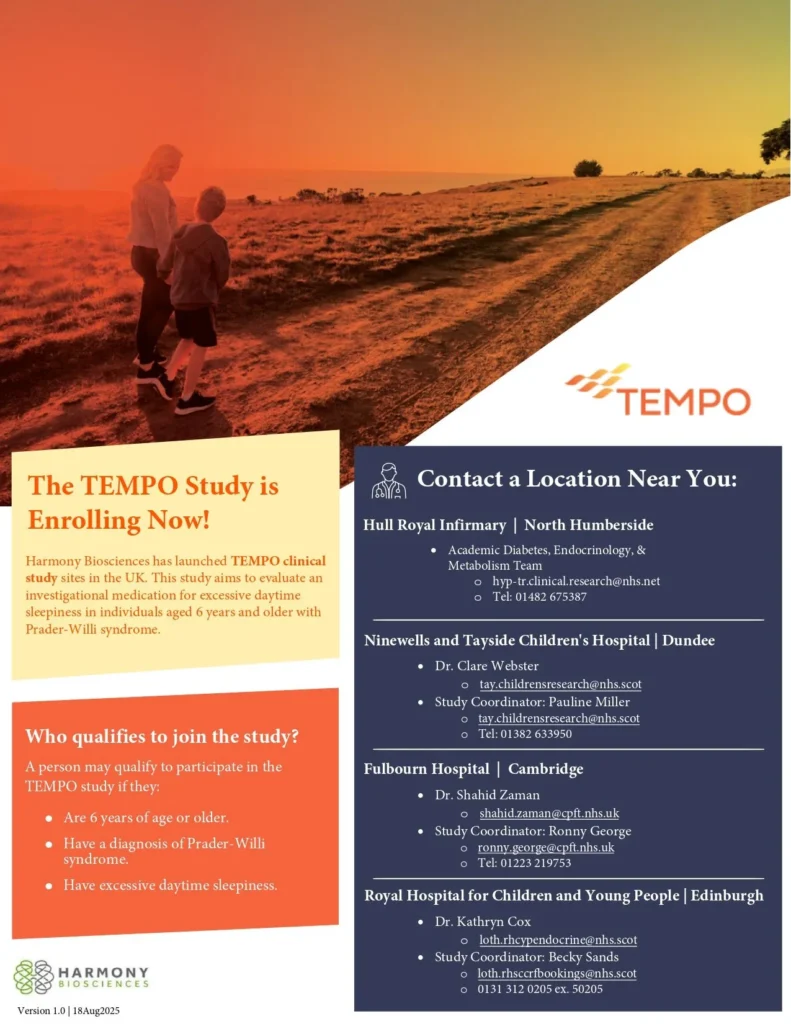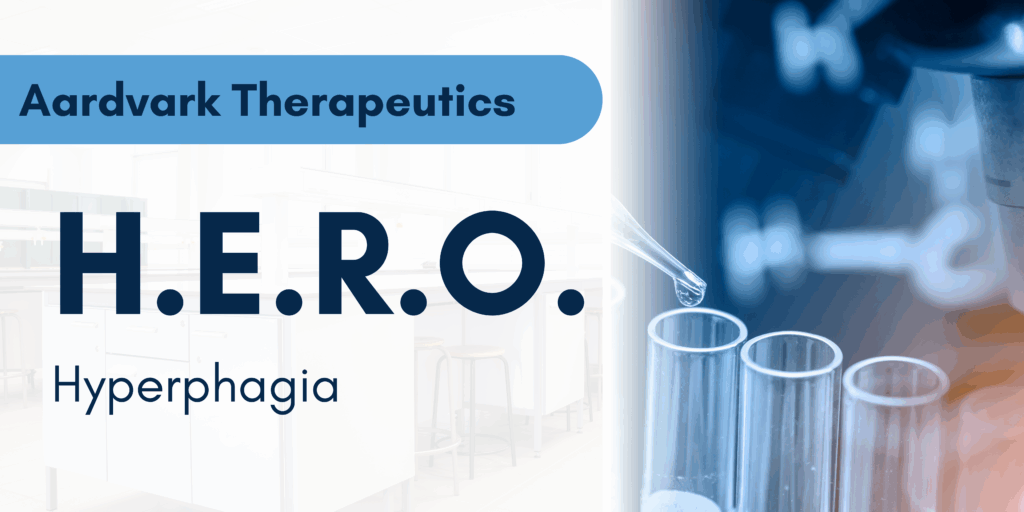Welcome to our Upcoming Trials page, a vital resource for individuals, families, caregivers and supporters of those affected by Prader-Willi Syndrome (PWS).
Finding effective treatments is crucial to enhancing the quality of life for those with PWS. That’s why we are excited to share the latest information on clinical trials that are paving the way for new therapies and interventions.
On this page, you will find detailed information about ongoing and upcoming clinical trials both in the UK and around the world. These trials are essential in the quest to develop new treatments and improve existing ones. By participating in these studies, patients and families can contribute to ground breaking research that has the potential to transform lives.

UK Trials

The TEMPO clinical trial is a research study led by Harmony Biosciences, designed to evaluate a potential new treatment for excessive daytime sleepiness (EDS) in individuals with Prader-Willi syndrome (PWS) aged 6 years and older.
This study is investigating the safety and effectiveness of an investigational medication called pitolisant, compared to a placebo. Researchers are also exploring its impact on irritability, disruptive behaviours, and hyperphagia (excessive eating)—all common challenges in PWS
The image below from Harmony Biosciences details more information about the eligibility for the trial and details of the four sites enrolling in the UK. You can also find out more about the trial in general from their US site at www.tempopwsstudy.com/


The HERO (Hunger Elimination or Reduction Objective) study is a clinical trial led by Aardvark Therapeutics. It is designed to evaluate a new investigational medication, ARD-101, for its potential to reduce hyperphagia—the intense and persistent hunger experienced by individuals with Prader-Willi syndrome (PWS).
ARD-101 is being studied to see if it can help the body release natural gut hormones that may reduce hunger and food-seeking behaviours in people with PWS.
Participants must:
- Be 13 years or older
- Have a confirmed diagnosis of PWS
- Have a designated caregiver who can attend visits and support the study process
Four sites are planned in the UK at London, Cambridge, Glasgow and Leicester. This study is currently not yet enrolling, but we are hopeful it will be soon. To find out more about the trial please visit www.heroforpws.com

The first ever treatment for hyperphagia was approved for use in the USA in March 2025. DCCR (Diazoxide Choline Controlled-Release) which is marketed in the USA as VYKAT XR, is a once-daily oral medication for people with Prader Willi Syndrome aged 4 and over and aims to reduce the constant drive to eat that affects many people with PWS.
The approval marks the first FDA approval of a drug for hyperphagia and the first new treatment for PWS since Growth Hormone in 2000.
Soleno Therapeutics, the company behind the drug, aim to make this available to patients outside of the USA. An application has already been made to the European Medical Agency (EMA), however following the UK’s departure from the European Union separate applications need to be made here. To bring new medicines to the UK requires approval from the MHRA (Medicines and Healthcare products Regulatory Agency) and then from the separate bodies in England, Scotland, Wales and Northern Ireland to make the medicine available on the NHS.
You can find out more about Soleno and VYKAT XR at https://soleno.life/

The COMPASS PWS trial was a Phase 3 clinical study led by Acadia Pharmaceuticals, investigating a potential treatment for hyperphagia in Prader-Willi syndrome (PWS).
The study is evaluated carbetocin (ACP-101), an investigational nasal spray drug designed to target the brain’s oxytocin system, which plays a role in regulating hunger and satiety.
The trial enrolled 175 adults and children aged 5-30 years with PWS from around the world including here in the UK. Unfortunately, Acadia announced on 24th September 2025 that after evaluating the trial results there was not a significant difference between the group taking the drug to the group taking the placebo and they therefore would be unable to continue with their investigations.

The MY-HQ (My Hyperphagia Questionnaire) study, led by Elizabeth Roof and her team at Vanderbilt University, is a project aimed at understanding how individuals with Prader-Willi syndrome (PWS) personally experience hunger.
While hyperphagia in clinical trials is typically measured through caregiver reports, MY-HQ seeks to capture the patient’s own perspective—providing a more direct and meaningful way to assess hunger-related behaviours.
Who Can Take Part?
- Individuals with PWS aged 10 years and older
- A caregiver must also be involved
- Open to English-speaking participants worldwide
The study is conducted via a short, structured interview using simple language and visual aids to ensure accessibility.
To learn more or express interest in participating, please contact Dr Elizabeth Roof at elizabeth.roof@vanderbilt.edu

The Global PWS Registry is an ongoing international research project that you can join at any time. It collects valuable information from individuals with Prader-Willi syndrome (PWS) and their families to help advance research, support clinical trials, and improve care.
By contributing your experiences, you help researchers better understand PWS and accelerate the development of new treatments. You can update your information over time, making it a powerful way to stay involved in research.
Learn more at https://fpwr.org.uk/global-registry/ or to take part go to https://pwsregistry.org
International Trials
This link connects you to our sister site in the USA and has a comprehensive list of trials taking place across the USA and beyond. PWS Clinical Trials (fpwr.org)
Stay Up to Date and get in touch
We regularly update our website with new trials and important announcements. Bookmark this page and check back often to stay informed about the latest advancements in PWS research.
Together, we can drive progress and bring hope to those living with Prader-Willi Syndrome. Thank you for your support and commitment to our mission.
For more information or to get involved, please contact us at info@fpwr.org.uk
